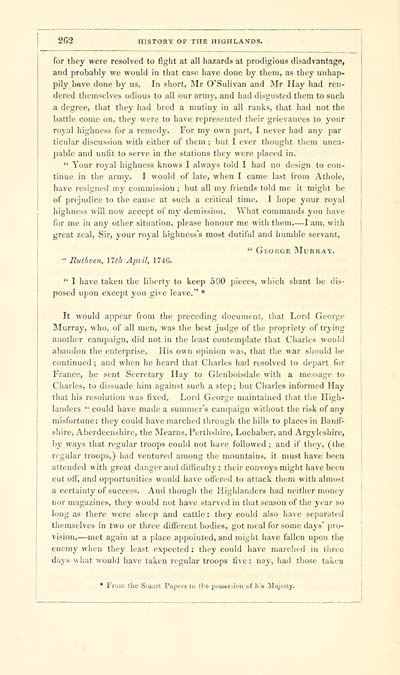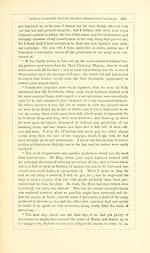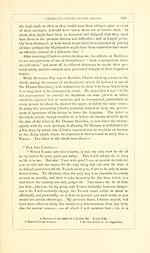Download files
Complete book:
Individual page:
Thumbnail gallery: Grid view | List view

2G2 HISTORY OP THE HIGHLANDS.
for tliry were resolved to fight at all hazards at prodigious disadvantage,
and probably we would in tliat case have done bj' them, as they unhap-
pily have done by us. In short, Mr O'Sulivan and Mr Hay had ren-
dered themselves odious to all our army, and had disgusted them to such
a degree, that they had bred a mutiny in all ranks, that had not the
battle come on, they were to have represented their grievances to your
royal highness for a remedy. For my own part, I never liad any par
ticular discussion with either of them ; but I ever thought them unca-
pable and unfit to serve in the stations they were placed in.
" Your royal highness knows I always told I had no design to con-
tinue in the army. I would of late, when I came last from Athole,
have resigned my commission ; but all my friends told me it might be
of prejudice to the cause at such a critical time. I hope your royal
highness will now accept of my demission. What commands you have
for me in any other situation, please honour me with them. — lam, with
great zeal. Sir, your royal highness's most dutiful and humble servant,
" George Murray.
" Ruthven, 17 th April, 174G.
" 1 have taken the liberty to keep 500 pieces, which shant be dis-
posed upon except you give leave." *
It would appear from the preceding document, that Lord George
Murray, who, of all men, was the best judge of the propriety of trying
another campaign, did not in the least contemplate that Charles would
abandon the enterprise. His own opinion was, that the war should be
continued ; and when he heard that Charles had resolved to depart for
France, he sent Secretary Hay to Glenboisdale with a message to
Charles, to dissuade him against such a step; but Cliarles informed Hay
that his resolution was fixed. Lord George maintained that the High-
landers " could have made a summer's campaign without the risk of any
misfortune: they could have marched through the hills to places in Banfl^-
shire, Aberdeenshire, the Mearns, Perthshire, Lochaber, and Argj-leshire,
by ways that regular troops could not have followed ; and if they, (the
regular troops,) had ventured among the mountains, it must have been
attended with great danger and difficulty : their convoys might have been
cut off, and opportunities would have ottered to attack them with almost
a certainty of success. And though the Highlanders had neither money
nor magazines, they would not have starved in that season of the year so
long as there were sheep and cattle : they could also have separated
themselves in two or three different bodies, got meal for sonic days' pro-
vision, — met again at a place appointed, and might have fallen upon the
enemy when they least expected : they could have marched in tiiree
days w hat would have taken regular troops five : nay, had those taken
• From the Siu.irt I'.-ipors in tbc [lusses-iiin uf h's M:0<-sly.
for tliry were resolved to fight at all hazards at prodigious disadvantage,
and probably we would in tliat case have done bj' them, as they unhap-
pily have done by us. In short, Mr O'Sulivan and Mr Hay had ren-
dered themselves odious to all our army, and had disgusted them to such
a degree, that they had bred a mutiny in all ranks, that had not the
battle come on, they were to have represented their grievances to your
royal highness for a remedy. For my own part, I never liad any par
ticular discussion with either of them ; but I ever thought them unca-
pable and unfit to serve in the stations they were placed in.
" Your royal highness knows I always told I had no design to con-
tinue in the army. I would of late, when I came last from Athole,
have resigned my commission ; but all my friends told me it might be
of prejudice to the cause at such a critical time. I hope your royal
highness will now accept of my demission. What commands you have
for me in any other situation, please honour me with them. — lam, with
great zeal. Sir, your royal highness's most dutiful and humble servant,
" George Murray.
" Ruthven, 17 th April, 174G.
" 1 have taken the liberty to keep 500 pieces, which shant be dis-
posed upon except you give leave." *
It would appear from the preceding document, that Lord George
Murray, who, of all men, was the best judge of the propriety of trying
another campaign, did not in the least contemplate that Charles would
abandon the enterprise. His own opinion was, that the war should be
continued ; and when he heard that Charles had resolved to depart for
France, he sent Secretary Hay to Glenboisdale with a message to
Charles, to dissuade him against such a step; but Cliarles informed Hay
that his resolution was fixed. Lord George maintained that the High-
landers " could have made a summer's campaign without the risk of any
misfortune: they could have marched through the hills to places in Banfl^-
shire, Aberdeenshire, the Mearns, Perthshire, Lochaber, and Argj-leshire,
by ways that regular troops could not have followed ; and if they, (the
regular troops,) had ventured among the mountains, it must have been
attended with great danger and difficulty : their convoys might have been
cut off, and opportunities would have ottered to attack them with almost
a certainty of success. And though the Highlanders had neither money
nor magazines, they would not have starved in that season of the year so
long as there were sheep and cattle : they could also have separated
themselves in two or three different bodies, got meal for sonic days' pro-
vision, — met again at a place appointed, and might have fallen upon the
enemy when they least expected : they could have marched in tiiree
days w hat would have taken regular troops five : nay, had those taken
• From the Siu.irt I'.-ipors in tbc [lusses-iiin uf h's M:0<-sly.
Set display mode to: Large image | Transcription
Images and transcriptions on this page, including medium image downloads, may be used under the Creative Commons Attribution 4.0 International Licence unless otherwise stated. ![]()
| Early Gaelic Book Collections > Ossian Collection > History of the Highlands and of the Highland clans > Volume 3 > (300) |
|---|
| Permanent URL | https://digital.nls.uk/79656022 |
|---|
| Description | Vol. III. |
|---|---|
| Shelfmark | Oss.249 |
| Attribution and copyright: |
|
| Description | Selected books from the Ossian Collection of 327 volumes, originally assembled by J. Norman Methven of Perth. Different editions and translations of James MacPherson's epic poem 'Ossian', some with a map of the 'Kingdom of Connor'. Also secondary material relating to Ossianic poetry and the Ossian controversy. |
|---|
| Description | Selected items from five 'Special and Named Printed Collections'. Includes books in Gaelic and other Celtic languages, works about the Gaels, their languages, literature, culture and history. |
|---|

